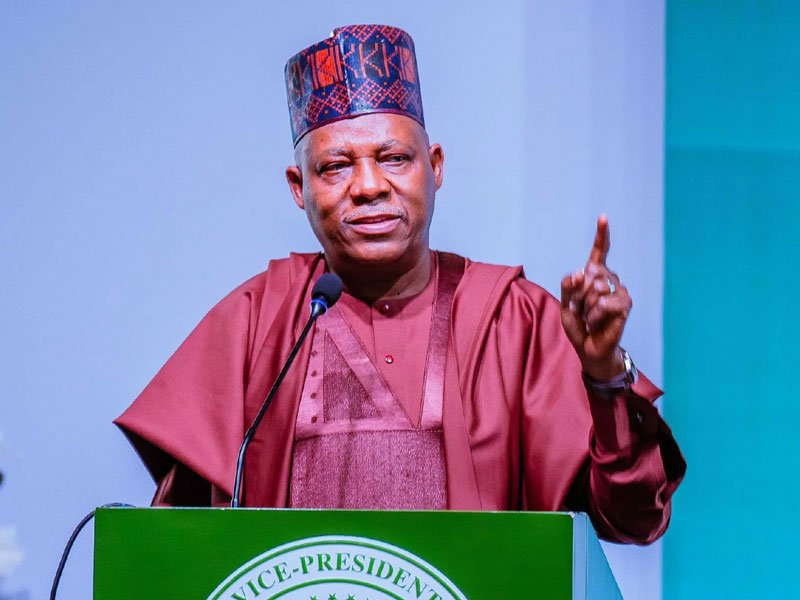Vice President Kassim Shettima on Monday affirmed the Federal Government’s commitment to fostering strong partnerships with the private sector to drive economic growth and industrialization in Nigeria.
According to him, the private sector is important in driving the industrialization and job creation agenda of the President Bola Tinubu administration.
During a meeting with the Nigeria Economic Summit Group (NESG) team ahead of the 30th Nigeria Economic Summit, the Vice President spoke about the government’s pro-business policies and the improvement of key infrastructure such as electricity. Our focus is on creating an environment where businesses can grow.
He said, “Our country has potential. Hope springs forever from the hearts of our people.” He also described NESG as “the best economy in the country” with the power to help Nigeria realize its potential. organization.”
Emphasizing the important role of electricity in driving industrialization, Shettima said: “Without electricity, there can be no industrialization. I believe that if we do the right thing, Nigeria will influence the development of Africa.”
He said the current administration is uniquely responsive to the needs of businesses.
“This government is led by someone who grew up in your ecosystem and speaks your business language. We’ve never had a more business-friendly government."
He also pledged support for the private sector, saying it is a vital partnership for economic growth, adding: “We want to create hope and opportunity for our young people, and the resources to do that are private. ” he added. we’ll do it. ”
Dr. Tope Fasua, Special Assistant to the President on Economic Affairs, urged the NESG to turn discussions into tangible results.
“There can be no economic development without growth. We look to the NESG to take this forward. Let’s start delivering results,” Fasua said.
Meanwhile, the NEC and Special Assistant to the President on Climate Change, Ruqaya El-Rufai, stressed the need for action, saying that to ensure post-summit coordination and an impactful outcome, “global discussions should be brought to bear on the ground”. He called on the NESG to “innovate.”
Earlier, the 30th Nigeria Economic Summit (NES#30) Chairman, Central Planning Commission/Vice-chairman of the Nigeria Economic Summit Group (NESG), Mr. Omoboyede Olusanya, said that the 30th Nigeria Economic Summit (NES#30) will discuss regulatory issues. He said it was an extremely important platform. Reforms essential to economic competitiveness.
He said key events will include meetings with CEOs from French-speaking countries and sessions addressing topics such as local pharmaceutical manufacturing and trends in the energy sector, with the aim of fostering cooperation between stakeholders for sustainable development. said to be included.
“Our goal is to build a workable framework to address Nigeria’s pressing economic challenges,” he said.
Mr. Oksanya noted that in addition to these discussions, the summit will host design workshops aimed at addressing important issues such as food security, digital inclusion, and healthcare access.
There will also be a high-level panel discussion addressing fiscal reform and infrastructure development, highlighting the need for strategic investment.
“We must use these discussions to build a more resilient economy,” Olusanya added.
Also on Monday, Shettima reiterated the unwavering commitment of President Bola Tinubu’s administration in addressing the core challenges of Nigeria’s food security, particularly the menace of malnutrition.
He said increased collaboration with international organizations and other key stakeholders would go a long way in supporting the efforts of both federal and state authorities.
Mr. Shettima made this known during an audience with a delegation led by World Food Program (WFP) Executive Director Mrs. Cindy McCain at the State House in Abuja.
According to him, “The President has demonstrated a commitment to addressing the core challenge of food security. He has declared a commitment to tackling food insecurity, strengthening food systems and We need more cooperation between WFP and the Nigerian government on improvements.”
Shettima said it was in line with the President’s vision for food security in Nigeria, where “the Federal Government is introducing a school feeding program to tackle child malnutrition”.
He called for further cooperation between the Ministry of Agriculture and WFP, particularly in strengthening food systems and combating malnutrition.
Recalling WFP’s support to Borno State during his time as Governor of Borno State, the Vice President said: They were there when we needed them and they stuck with us and rallied around us without bothering the gallery.
“I would like to sincerely thank you all for your efforts and ask for your continued efforts.The Governor of Borno State is a very dedicated and honest gentleman. But the challenges in Borno, like in other parts of the country, are enormous,” he added.
Mr. McCain began his remarks by saying that he and his team were visiting the country to explore further areas of cooperation between Nigeria and the World Food Program in addressing the challenges facing its people.
She said WFP was excited about the government’s efforts to tackle the challenges of food security and malnutrition, adding: “The unique potential to explore African-led solutions to the challenges is exciting and deserves praise. ” he pointed out.
She pledged the organization’s continued support and partnership with authorities at various levels in Nigeria, especially to alleviate the suffering of people in conflict-affected areas.
Digi Hermoe
follow me:

